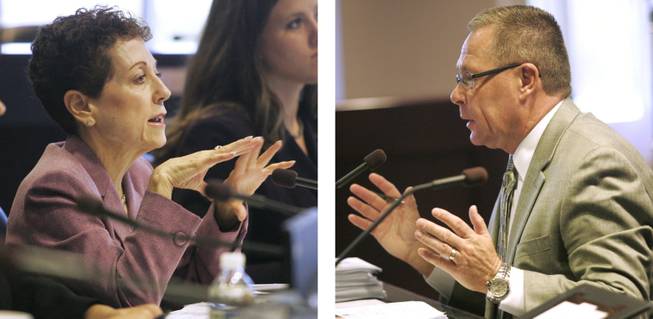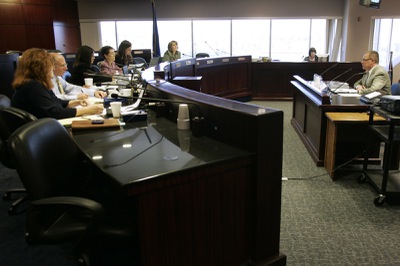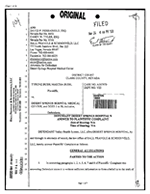
Sen. Valerie Wiener questions Bill Welch, president and CEO of the Nevada Hospital Association, during Tuesday’s meeting of the Legislative Committee on Health Care.
Wednesday, July 21, 2010 | 2 a.m.
Do No Harm: Hospital Care in Las Vegas
- Prologue: A breakthrough in transparency
- Reporting is the first of its kind in Nevada
- Health care can hurt you
- Accident took her life, his heart
- Fall proves fatal for elderly patient
- Inadequate care, unspeakable pain
- Scarred for life by mistake in surgery
- Where I Stand: Fascination and frustration in reporting on Las Vegas hospital care
- Editorial: Preventing harm
- Health care leaders discuss Sun report’s findings
- St. Rose Dominican Hospitals to post data on quality
- State presses hospitals for full accounting of preventable injuries
Share your stories
Lawmakers approved Tuesday drafting bills to require Nevada hospitals to report, by facility, the preventable infections and injuries patients suffer while in their care.
Members of the Legislative Committee on Health Care, who unanimously approved the two bill drafts, called an ongoing Las Vegas Sun investigation into patient harm at valley hospitals a “catalyst” for their actions.
Sentinel events — the unexpected incidents that cause injury, or the risk thereof, in a hospital — have previously been reported as a statewide total, rendering the information useless for consumers wanting to compare the facilities’ safety records. Experts say it is also a hindrance to hospital accountability.
The Sun identified 969 incidents of harm recorded in Las Vegas hospital billing records in 2008 and 2009 and named the hospitals where they occurred.
Assemblyman Dr. Joe Hardy, R-Boulder City, said that if the newspaper is already reporting the information, there doesn’t appear to be a reason for regulators not to require that sentinel events be reported by facility. It could clear up confusion between what hospitals report as sentinel events and what can be identified as harmful events in their billing records on file with the state, he said.
Although lawmakers have discussed proposing laws on public disclosure of sentinel events and infections, the newspaper’s stories prompted the push for more transparency, said Hardy, a family doctor and the only physician in the Legislature.
“If it weren’t for the press you wouldn’t have a lot of things done,” he said.
The draft legislation involving infections relates to a 2009 law that requires Nevada hospitals to report certain infections to the National Healthcare Safety Network, which is run by the federal Centers for Disease Control and Prevention. The law allowed, but did not mandate, state health officials to report the information by individual hospital. The bill proposed Tuesday would require the information to be publicly reported by facility.
Bobbette Bond, who lobbies for insurance companies as executive director of the Nevada Health Care Policy Group, said the proposed bills would represent more progress toward transparency in health care than has been made in almost a decade. Public reporting of infections and sentinel events would help the hospitals improve and give consumers the information they need when making health care decisions, Bond said.
“It pushes improvement forward,” she said. “If you don’t have any public reporting, you don’t feel that pressure of the hospitals competing with each other. Competition drives change.”
The legislative committee meeting included a discussion with Nevada Hospital Association chief lobbyist Bill Welch about issues raised in the Sun’s investigation, “Do No Harm: Hospital Care in Nevada.”
Before the Sun published its stories, Welch, president and CEO of the association, was certain that Nevada hospitals always complied with the law by reporting every sentinel event to the state.
He didn’t sound as sure talking to legislators Tuesday. “I can’t say, nor will I say, that we are absolutely confident that every individual incident that should have been reported was reported,” Welch said. “But I want to say for the record that our hospitals make a diligent effort to show that they are reporting.”
The Sun identified 1,363 cases of preventable harm statewide in acute-care hospitals in 2008 and 2009. The incidents appear to qualify as sentinel events, but during the same period the hospitals reported 402 sentinel events.
State regulators have launched a case-by-case investigation of the discrepancy, and hospitals could be fined if they have failed to report sentinel events. The state requires reporting of the injuries because the process includes creation of a corrective action plan intended to avoid future cases of harm.
Welch said many of the injuries and infections noted in the billing records are “adverse” events, a term that has no legal meaning in Nevada. They may not fit Nevada’s definition of a sentinel event, he said, because some of the infections or injuries may have been present at the time of admission. Welch posed scenarios in which doctors were forced to treat an urgent condition such as a heart attack and missed an infection or decubitus ulcer.
But the Sun’s analysis shows that 267 of the 969 cases of patients being harmed in Las Vegas hospitals were elective admissions. Also, the Sun reported only incidents the hospitals had noted were not present at the time of admission.
In other cases, Welch said an injury would not be considered a sentinel event because it was not unexpected.
Welch also pointed out that the data is useful in identifying problems on a “global” level, but that it has limitations because it’s not a medical record. “This is not the most accurate tool to generate a clinical conclusion,” Welch said.
Bond countered, saying the billing data is widely accepted by groups such as the federal Agency for Healthcare Research and Quality and the Centers for Medicare & Medicaid Services, which uses the hospital records to determine compensation.
“There is no better or more effective tool,” Bond said.





Join the Discussion:
Check this out for a full explanation of our conversion to the LiveFyre commenting system and instructions on how to sign up for an account.
Full comments policy